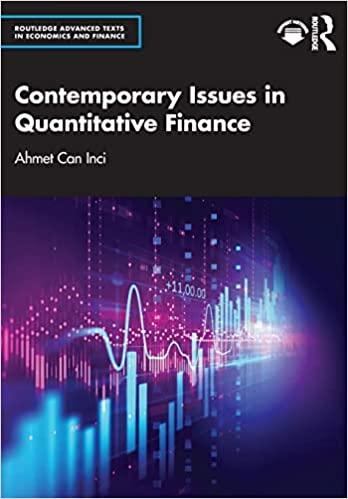Answered step by step
Verified Expert Solution
Question
1 Approved Answer
As discussed in the text, in the absence of market imperfections and tax effects, we would expect the share price to decline by the amount
As discussed in the text, in the absence of market imperfections and tax effects, we would expect the share price to decline by the amount of the dividend payment when the stock goes ex dividend. Once we consider the role of taxes, however, this is not necessarily true. One model has been proposed that incorporates tax effects into determining the exdividend price:
P PXD TP TG
where P is the price just before the stock goes ex PX is the exdividend share price, D is the amount of the dividend per share, TP is the relevant marginal personal tax rate on dividends, and TG is the effective marginal tax rate on capital gains.
a
If TP TG how much will the share price fall when the stock goes ex
multiple choice
P
D Correct
PX
b
If TP percent and TG how much will the share price fall? Do not round intermediate calculations and round your answer to decimal places, eg
c
If TP percent and TG percent, how much will the share price fall? Do not round intermediate calculations and round your answer to decimal places, eg
d
Suppose the only owners of stock are corporations. Recall that corporations get at least a percent exemption from taxation on the dividend income they receive, but they do not get such an exemption on capital gains. If the corporations income and capital gains tax rates are both percent, what does this model predict the exdividend share price will beDo not round intermediate calculations and round your answer to decimal places, egGecko Company and the Gordon Company are two firms that have the same business risk but different dividend policies. Gecko pays no dividend, whereas Gordon has an expected dividend yield of percent. Suppose the capital gains tax rate is zero, whereas the income tax rate is percent. Gecko has an expected earnings growth rate of percent annually, and its stock price is expected to grow at this same rate. The aftertax expected returns on the two stocks are equal because they are in the same risk class What is the pretax required return on Gordons stock?
Step by Step Solution
There are 3 Steps involved in it
Step: 1

Get Instant Access to Expert-Tailored Solutions
See step-by-step solutions with expert insights and AI powered tools for academic success
Step: 2

Step: 3

Ace Your Homework with AI
Get the answers you need in no time with our AI-driven, step-by-step assistance
Get Started


